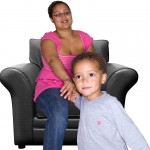
We have posted previously on these pages about the barriers that people with learning disabilities face as parents. We have also though pointed to the evidence that suggests that timely and appropriate support can help parents to provide a loving environment for their child.
The authors of this Australian study point out that mothers with learning disabilities are much more likely to have their child removed than those without learning disabilities, but that there has been little work on trying to understand the mothers’ perspectives on this. There have been some studies which report the mothers having feelings of grief and loss as well as a sense of powerlessness when faced with the child protection system.
The researchers in this small qualitative study set out to look at how mothers develop a narrative around their experiences. They worked with seven mothers with learning disabilities who had had their children involuntarily removed and taken into care. They spent time building up this picture and analysed the material to identify the key themes.
They found that for most of the seven mothers, having a child removed and taken into care was not a one-off experience. The researchers found three different narratives that explained this serial experience. In some cases, the women told a different narrative for each of their removed children. Unsurprisingly perhaps, all the women in the study continued to be focused on their children in care.
The authors suggest that their findings add to the development of a richer picture of the experiences of mothers with learning disabilities whose children are taken into care. The fact that there are several different narratives developed around these experiences by the mothers concerned suggests a range of different potential support needs. They suggest a need for more research
to identify any adverse health and social consequences for mothers with children in care as well as the effects on their children.
Mothering differently: Narratives of mothers with intellectual disability whose children have been compulsorily removed, Mayes R & Llewellyn G, in Journal of Intellectual and Developmental Disability, 37, 2 , 121-130
